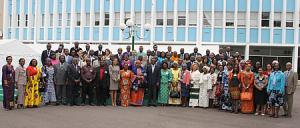Regional consultation on universal access to Sexual and Reproductive Health
WHO convened a three day meeting of countries and partners on achievement of universal access to sexual and reproductive Health (SRH) since the call made by the International Conference on Population and Development (ICPD) in 1994, involving 179 countries. It defined critical actions for advancing sexual and reproductive health beyond 2014. The meeting took place on 8-10 July 2014, at the WHO Regional Office for Africa, Brazzaville, Congo.
The consultation, whose aim was to take stock of progress made since the ICPD in 1994, was organized in collaboration with the Reproductive Health and Research Department of WHO headquarters, reviewed barriers and successes and identified strategies to accelerate progress in priority areas.
Participants from 28 countries, United Nations Agencies (WHO, UNFPA, UNICEF, UNAIDS, UN WOMEN), USAIDS, professional societies (Obstetrics, Gynaecology, Pediatrics, Midwifery) the West African Health Organization, Non-Governmental Organizations and Development Partners, participated in the meeting.
Key issues discussed during the meeting included: achievement of universal access to SRH; equity, equality and human rights; prevention of violence against women and girls, including child marriage; reducing unmet need for family planning; addressing adolescent sexual and reproductive health.
Following intensified deliberations, the participants agreed on and adopted recommendations along the following lines:
In the area of achievement of universal access to SRH, the meeting adopted recommendations on policy and programmatic interventions related to ensuring that SRH remains a priority within international sustainable development goals, with clear and measurable targets, and proposed strategies for community engagement and an outline of research gaps and priorities. The recommendations called for working with community, religious and traditional leaders to increase acceptance and use of sexual and reproductive health information and services, collection, disaggregation and analysis of data, conducting qualitative and implementation research, in order to understand and meet the needs of all individuals including vulnerable and difficult to reach populations.
Regarding equity, human rights, prevention of violence against women and girls, including child marriage, the meeting recommended a strong legal and policy framework to ensure a rights-based approach to comprehensive SRH services; joint development of standard operating procedures; training for providers and community outreach campaigns; engaging men in strategies to prevent and address Gender Based Violence (GBV) and Female Genital Mutilation (FGM) and for the empowerment of girls and women, and capacity building for health care providers to identify and respond to Gender Based Violence, including referring survivors to appropriate legal avenues.
To address and reduce unmet need for family planning, the meeting recommended, among others, advocating for the establishment of a dedicated budget line for contraception; removal of barriers to family planning adoption; review of legislation that restricts access to services and implementation of laws and policies that respect human rights and promote gender equality.
To address adolescent sexual and reproductive health, the meeting recommended the following, among others: engagement of adolescents and young people in all aspects of programme design and management; institutionalization of youth participation in SRH through the establishment of youth networks; elimination of policies that place medical and social restrictions on the provision of contraceptives to adolescents; earmarking of sufficient financial and human resources for implementing nationwide programmes to provide youth friendly SRH services; advocating for increasing the legal age of marriage to 18, and where this law exists, working to ensure full implementation of the law; provision of comprehensive sexuality education for all adolescents, engaging and drawing upon the support of parents and community leaders in provision of accurate sexual and reproductive health information and emphasizing education at family level.



